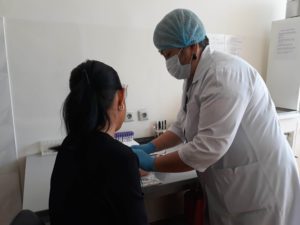
Author: Olga Ochneva, Kyrgyzstan
Kyrgyzstan is getting prepared to receive a certificate to confirm elimination of mother-to-child transmission of HIV. In the last five years, over 95% of pregnant women were covered with prevention projects, while the new cases of vertical HIV transmission are now at the level of 2%.
Testing is an integral part of prevention
Since 2007, all pregnant women have been tested for HIV when registered in maternity care. In case of a positive result, the woman is registered with HIV treatment facilities and receives consultations on the need of antiretroviral treatment (ART).
“A good, easy-to-understand consultation leads to the woman giving her voluntary consent to the therapy initiation. There are rare cases when women refuse treatment due to the lack of knowledge or religious beliefs, but most often – due to their self-stigmatization. The share of such refusals is now less than 2%,” says Erkin Tostokov, physician working at the Prevention Unit of the Republican AIDS Centre. “There are some cases when a woman is first seen by the doctor only when she delivers her baby. For such women, we do rapid HIV testing in the maternity clinics and, if HIV is confirmed, we hand out ART drugs right there. We update our clinical protocols in line with the most recent WHO guidelines and train our doctors on a regular basis.”
Children born to HIV-positive mothers go through several stages of examination: early diagnostics to identify if the foetus is infected intra uterine; then within 4-6 weeks doctors have to exclude HIV transmission during the delivery; and the last test allows detecting the HIV status of the infant after the breastfeeding is completed. Children receive preventive ARV therapy depending on their risk level and receive monthly social benefits during the whole period until final confirmation/non-confirmation of the diagnosis (up to 18 months).
Social benefits for children living with HIV
Elena learned that she had HIV in 2011. In a while, the woman found out that she was pregnant. Back then, she was in a difficult situation: no job, no place to live, and no money. The woman felt lost because of her HIV status.
“The doctor prescribed ART and I started taking the pills, though before I refused to take the therapy because of my allergy,” Elena recalls. “When my daughter was born, she received preventive therapy for two months. When my girl was 18 months, the doctors did the last test and took her off the register as she was perfectly healthy. However, I was still scared and took her for HIV testing until she was four years old.”
Now about half of the money allocated by the state for the HIV component goes to the procurement of test kits for pregnant women. The government provides social benefits for children living with HIV and free breast milk substitutes.
“In the recent 7-8 years, our programmes to prevent mother-to-child transmission of HIV achieved a big progress: the share of such transmission was reduced from nine to one percent,” says Aybek Bekbolotov, Deputy Director of the Republican AIDS Centre. “To a great extent, this result was achieved through the efforts of doctors working in general and maternity clinics. Now there is almost no pregnant woman whom we miss. All maternity clinics have been provided with rapid HIV tests and ART drugs. We received a strong support from UNICEF. They provided training to doctors, supported the launch of early diagnostics in newborns and rapid testing in maternity clinics. Now they help us to get prepared to receive the certificate of having eliminated mother-to-child transmission of HIV. A country can get such a certificate provided that the rate of vertical transmission is less than 2% and if over 95% of pregnant women have been covered with prevention programmes in the recent two years. There are certain requirements to indicators and procedures to calculate such data, and now we are working on meeting them.”
Support and training in the summer camp
Currently, there are 478 children with HIV registered in care, 464 of them receive treatment. Every year, summer camps are held for children living with HIV with UNICEF support. This year, this event will be brought to the international level for the first time.
“In July, there will be a one-week summer camp for children, parents, doctors and social workers from Kyrgyzstan, Kazakhstan, Tajikistan, Uzbekistan, and Turkmenistan. There will be trainers from the UK, Ukraine, Russia, Germany, Spain, the Netherlands, and Italy,” tells Aybek Bekbolotov. “The camp will include several parallel events: a forum for adolescents living with HIV and their parents, workshop for pediatric medical staff and training for psychologists and social workers.”
Medical and social workers will be trained to work with children living with HIV, while children and their parents will develop support and leadership skills and are expected to form a new community.



